Did you know that personalization makes 65% of consumers loyal to your brand? Traditional retail struggles to achieve this, but DTC eCommerce excels. Imagine no middlemen involved — just you and your customers.
Though starting with a direct-to-consumer model might seem daunting, GenovaWebArt has got your back. We’ve spent years building successful DTC Shopify businesses from scratch. In fact, 90% of our clients are DTC brands, including our Shopify Plus giants Kit & Kin and Ten Thousand.
This guide equips you with everything you need to succeed in the DTC market. Core benefits, tips and best practices, potential challenges, and six real-world DTC examples are what you’re going to explore.
Table of Contents
- Differences Between D2C, B2C, Wholesale, and Retail
- Why Are Brands Going Direct-to-Consumer (DTC)?
- Why DTC Brands Choose Shopify?
- 6 Examples of DTC Brands on Shopify
- Tips for Getting Started with D2C Selling
- Best Practices of Shopify D2C
- Main Direct-to-Consumer Challenges
- How GenovaWebArt Can Help DTC Brands
- Wrapping Up
- FAQ
Differences Between D2C, B2C, Wholesale, and Retail
Well, let’s see how direct-to-consumer differs from other popular business models.
B2C or business-to-consumer is a general term for companies selling goods from the manufacturer to end consumers. The same applies to retail.
The D2C brands, on the other hand, typically sell the products they manufacture. For example, a sportswear company launches its online store to distribute its products instead of selling them through fashion retailers like ASOS.
The wholesale model involves the supply of products in large volumes. It works like that: wholesalers receive goods from a manufacturer or several manufacturers and then distribute them to retailers.
Why Are Brands Going Direct-to-Consumer (DTC)?
Today’s consumers increasingly turn to DTC brands. For example, instead of scrolling the FARFETCH fashion retailer’s website in search of luxury clothes, the buyer will visit the online store, say, Gucci, directly.
Big brands have already noticed this D2C trend and created their online stores. Nevertheless, the DTC model will also be advantageous for less well-known companies.
In particular, the following eCommerce businesses need to adopt this approach:
- Companies that do not get enough sales from resellers
- Businesses that want to open new retail and DTC sales channels
- Companies that seek to build relationships with buyers directly
If at least one of the points applies to you, then consider using the DTC model.
Benefits of the Shopify D2C Business Model
Let's now look at the main benefits of implementing a D2C business model solution:
- Compete with established retail brands. A DTC brand can show its uniqueness and easily stand out from the typical retailers. In addition, it is much easier for consumers to perceive the values of individual brands.
- Control your distribution channels. You completely take over goods management and do not need intermediaries in the DTC business model. It gives you the advantage of complete transparency in the operations of your online store.
- Get instant customer feedback. Since you communicate with consumers directly in the DTC model, you can easily collect their feedback, study their behavior, and, as a result, better understand their preferences and needs. Thanks to all this, you can bring more relevant offers to your customers.
- Attract more funding. By building a strong brand with a unique mission, goals, and audience, you can more easily attract investment. It will allow you to expand your Shopify online store further.
- Personalize customer experience. DTC brands are also about a personalized consumer experience. It is possible because you are broadcasting your vision while keeping your buyer’s needs in mind.
- Boost margins without raising the price. Because you don’t rely on intermediaries that require a share of product revenue, you can increase your profit margins without affecting product prices.
- Improve your marketing efforts. Based on the data you collect directly from consumers, you can better adjust the marketing campaigns of your online store.
Why DTC Brands Choose Shopify?
Looking at the various DTC brands, you’ll probably notice that many of them use Shopify as the basis for their online stores. But why do companies choose this eCommerce platform?
Shopify D2C brands can personalize their online store according to their concept and vision. Buyers who visit these eCommerce stores will most likely remember their unique Shopify-based websites.
On top of that, with Shopify, you can track every transaction and your customer’s journey from the moment they enter your store until they make a purchase. It’s especially convenient because you need to manage all processes yourself.
Another reason to launch your DTC brand on Shopify is the platform’s tech capabilities. With its help, you can create a performant, multifunctional, and scalable website.
6 Examples of DTC Brands on Shopify
The best way to understand the possibilities offered by Shopify is to look at the top DTC brands examples. We have collected a selection of five online stores for you:
1. Condor
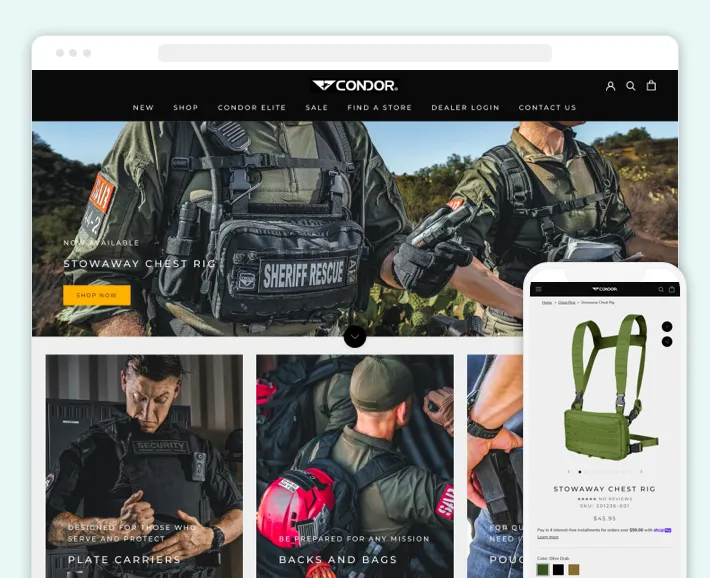
Condor is a brand that sells tactical and recreational gear. They only recently launched their direct-to-consumer online sales and chose Shopify to implement their strategy.
2. Cuts Clothing
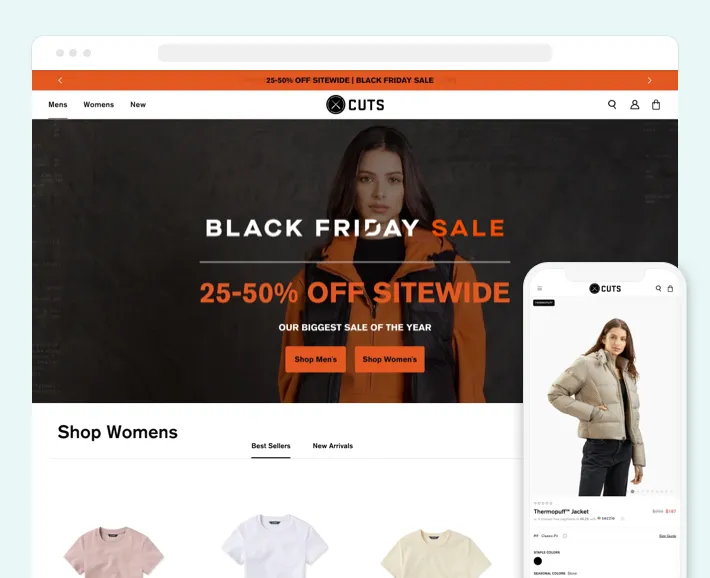
Cuts Clothing is a DTC brand that sells sports and leisure apparel. Like the minimalist and comfortable clothes the company sells, their online store is just as simplistic. At the same time, this brand has an ambitious positioning, stating that it inspires people to compete and win.
3. Blume
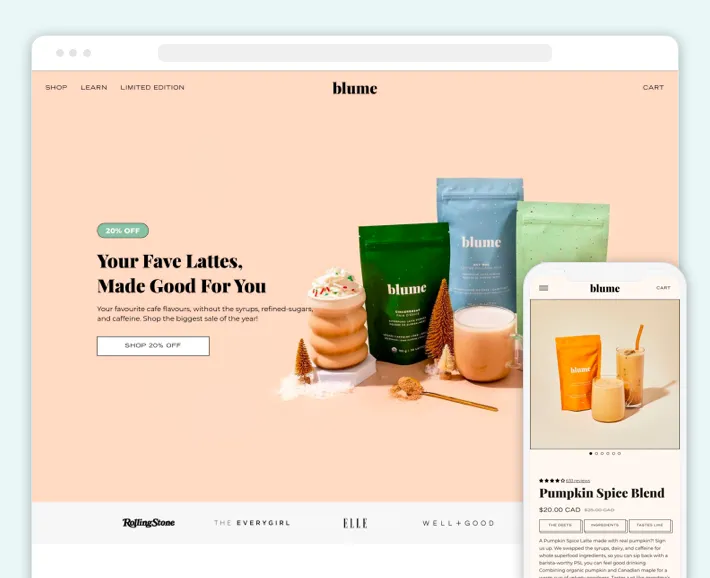
Blume is a brand that distributes various latte blends. Here, customers can find non-standard combinations of coffee with such ingredients as turmeric or cardamom. Blume’s target audience is people who value the morning coffee ritual. Shopify platform ensures that every interaction with this store is smooth and meaningful: almost as if you tried those lattes through your screen.
4. Kit and Kin
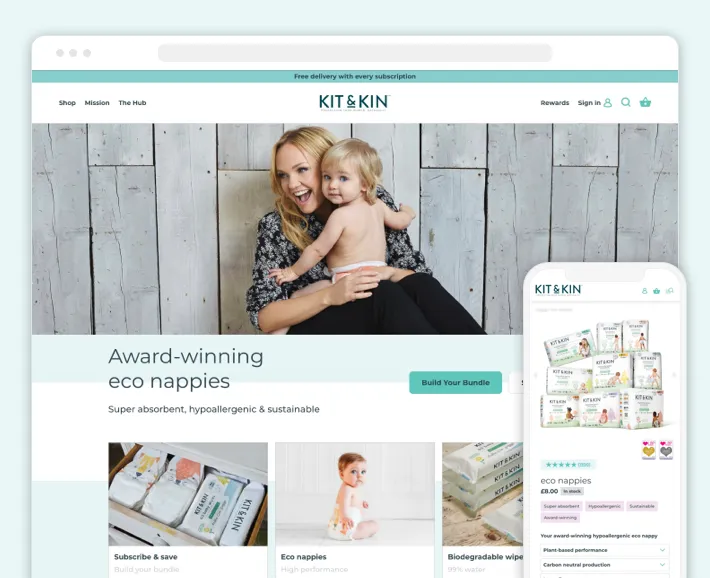
Kit & Kin is a D2C brand that sells natural and sustainable nappies and other baby products. Their goal is to deliver harmless goods to children and the world. The GenovaWebArt team has helped this store migrate to Shopify Plus and provides ongoing support for this brand.
5. Ten Thousand
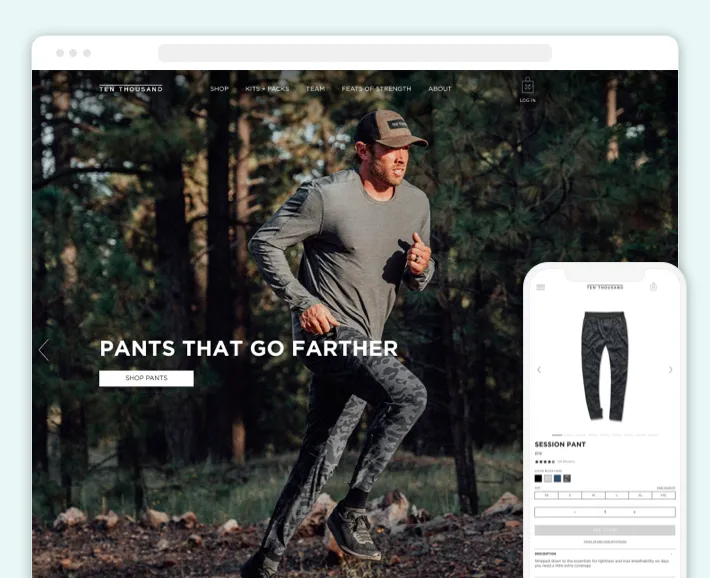
Ten Thousand is a men’s sportswear brand. This company promotes continuous improvement through sports, aiming to create gear worthy of top athletes. GenovaWebArt provides ongoing Shopify support for this store to deliver a strong digital presence and unique design.
6. Allbirds
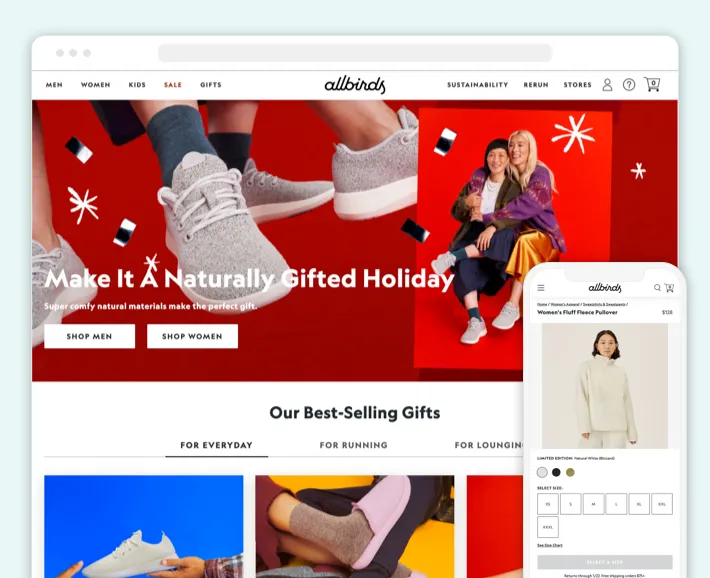
Allbirds is a shoe and clothing brand focused on sustainability. Their feature is high-quality items made of wool, which impress with the simplicity of their design. Thanks to Shopify, the brand could build a loyal digital fan base even before opening its first pop-up store.
Tips for Getting Started with D2C Selling
Suppose you already have a website for your brand, or you want to open your eCommerce store. Where to start? Here are some suggestions:
- Take care of your reputation. The DTC model provides for business operations independent of intermediaries. Therefore, you should have a decent reputation to attract as many buyers as possible.
- Rely on yourself. Withhold from getting hung up on marketplaces or retailers. Of course, you can significantly increase sales through such channels, but your focus now is building a direct-to-consumer model. It is better to invest in promoting your channels.
- Decide on the methods of the goods delivery. As a DTC brand owner, you need to know exactly how you will fulfill online orders and how you will deliver them. You can do it yourself or, at first, turn to retailers for assistance.
- Consider the online store expenses. Think about how much money it will cost to scale your Shopify business, what platform you choose, how many workers you need to maintain the website, etc.
These are the fundamental tips on how to start selling on the D2C model. If you need a more detailed consultation, contact GenovaWebArt experts, as we always follow the latest DTC trends in our projects.
Best Practices of Shopify D2C
If you want to become one of the Shopify DTC brands, consider the best practices to make your online store pop up.
Take Care of Customer Experience
In the case of the direct-to-consumer model, you must pay close attention to your customers. It is what you should do when developing your Shopify online store. Consider how consumers will behave on your website and make navigation as simple and clear as possible.
Deliver an In-Store Experience
Shoppers still often rely on brick-and-mortar stores for a variety of reasons. It may be necessary to test the product in person, try on clothes, etc. Therefore, combining an online store with a brick-and-mortar one would be good.
Prioritize Customer Support
Only start an online store by hiring a customer support team. With it, you will be able to deliver a flawless experience. And in the eCommerce industry, timely response to customer questions and issues is critical to business success.
Set Realistic Expectations
When starting a DTC brand, you should be ready that it will take time to go smoothly. Managing an online store can be challenging, considering how many different processes you have to set up yourself and related investments. However, carefully planning and setting realistic expectations will help you cope.
Main Direct-to-Consumer Challenges
Although the DTC retail strategy has many undeniable advantages for businesses, there are some limitations that you may encounter along the way. So let’s take a closer look at the potential challenges so you can prepare for them in advance.
- Everything is on you. You take on multiple responsibilities in the DTC model, from warehouse management to marketing and shipping products. It can be a challenge if you don’t have an experienced team around you.
- Increased risks. With proper preparation, the DTC business model can be a safe venture. Otherwise, you may fail to withstand the competition or suffer losses due to problems with the cyber security of the online store.
- Potentially complex supply chains. Again, setting up supply chains on your own can be difficult, and you can run into various pitfalls without a good understanding of how to do it.
- Possible increased costs. With the DTC model, you can profit significantly but yet experience additional expenses. It’s because you are involved in manufacturing, supply, product promotion, and more.
- Lack of technology. Another limitation you may face is an inefficient online store backed up by outdated technologies. It can become a severe problem, as today’s consumers often judge brands purely by the look and feel of their websites.
How GenovaWebArt Can Help DTC Brands
GenovaWebArt is a certified expert in Shopify design and development. Besides that, we’ve worked with DTC brands for more than seven years, and direct-to-consumer companies make up about 90% of our clients. Our team is eager to help with your DTC store as well, as we know all the stages such brands go through on the way to the development of online sales.
Note that GenovaWebArt has nothing to do with typical DTC brands. We offer solely unique solutions that completely follow your vision. Our team also creates these online stores fast and efficiently.
What else can you expect from us:
- Shopify theme development and customization
- Shopify app development
- Shopify markets setup
- Shopify design
- Shopify solutions from scratch
Two of the best Shopify DTC brand examples mentioned today, Kit & Kin and Ten Thousand, are the results of our diligent work. You can discover even more DTC projects like Winky Lux, Early Rider, and Paper Republic in our portfolio.
Wrapping Up
More and more eCommerce businesses are turning to the DTC model. It’s quite natural since this approach allows them to better interact with customers and handle all operations themselves. Such companies typically choose Shopify as their platform for its scalability, customization, and effortless online store management process.
If you are interested in launching your own DTC brand, GenovaWebArt can help. With our extensive Shopify expertise, it’s never been easier. All you need to do is to drop us a line.
Frequently Asked Questions
What Shopify apps are useful for DTC brands?
How fast does a DTC brand start selling from a Shopify store?
How much does it cost for a DTC brand to get started on Shopify?
What are some DTC brands examples on Shopify?
What are the benefits to businesses when using the eCommerce DTC model?
- Personalized customer experience.
- Improved marketing efforts.
- Increased margins.
- Instant customer feedback.
- Full control over distribution channels.
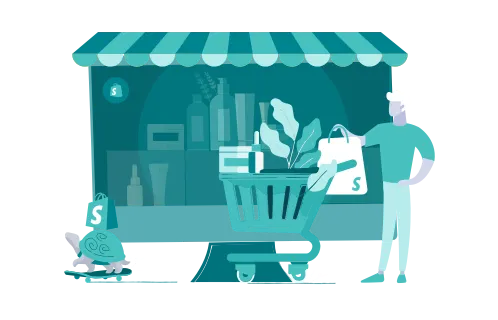
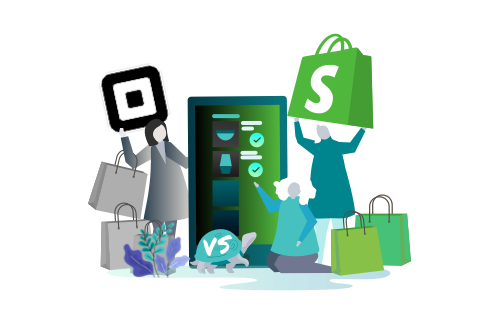

![Shopify Sales Channels [Complete Guide] - GenovaWebArt blog article, banner image Shopify Sales Channels [Complete Guide] - GenovaWebArt blog article, banner image](https://genovawebart.com/hubfs/img/webp/hero-banner-blog-article-shopify-sales-channels.webp)



